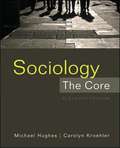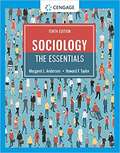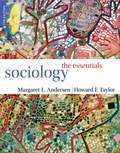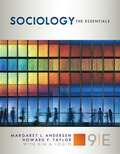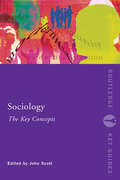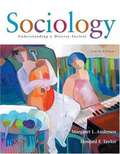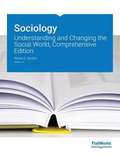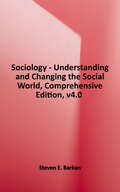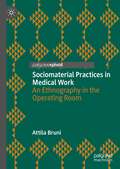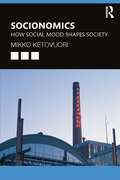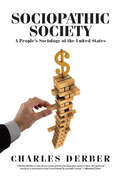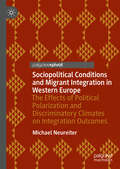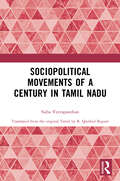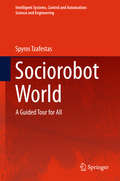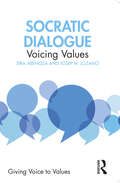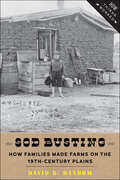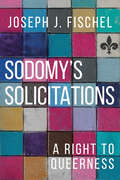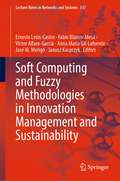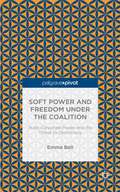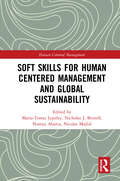- Table View
- List View
Sociology: The Core (Eleventh Edition)
by Michael Hughes Carolyn J. KroehlerHighly respected for its scholarship and straightforward approach, this text covers core sociological concepts with a brief and accessible presentation at an affordable price. In the eleventh edition, Sociology once again comes alive as a vital and exciting field to relate sociological principles to real-world circumstances.
Sociology: The Essentials
by Margaret L. AndersenSOCIOLOGY: THE ESSENTIALS, Tenth Edition, uses the theme of debunking myths to look behind the facades of everyday life, encourage you to question common assumptions, and help you better understand how society is constructed and sustained. This thorough yet streamlined text provides exceptional coverage of diversity, including social factors such as age, religion, sexual orientation, and region of residence, in addition to race, ethnicity, class, and gender. Updated with coverage of the latest findings, trends, and themes, this new edition's reader-friendly presentation teaches you the concepts, methods, and research that will sharpen your "sociological imagination" and help you view the world from a different perspective.
Sociology: The Essentials (7th Edition)
by Margaret L. Andersen Howard F. TaylorThis book uses the theme of debunking myths to look behind the facades of everyday life, encourage you to question common assumptions, and help you better understand how society is constructed and sustained.
Sociology: The Essentials, Ninth Edition
by Kim A. Logio Margaret L. Andersen Howard F. TaylorSOCIOLOGY: THE ESSENTIALS, Ninth Edition, uses the theme of debunking myths to look behind the facades of everyday life, challenge common assumptions, and help students develop critical thinking skills as well as better understand how society is constructed and sustained. This thorough yet streamlined text employs a reader-friendly presentation and manageable structure, while maintaining a strong focus on sociology concepts, methods, and research. Updated throughout with coverage of the latest findings, trends, and themes, the text provides exceptional coverage of diversity, including social factors such as age, religion, sexual orientation, and region of residence in addition to race, ethnicity, class, and gender.
Sociology: The Key Concepts (Routledge Key Guides)
by John ScottAn essential A-Z guide to the full range of sociological thought, Sociology: The Key Concepts is an important addition to the established and successful Key Concepts series. Fully cross-referenced with an extensive glossary, this accessible text also includes: alphabetical listings of key concepts for ease of use suggestions for further reading to enhance understanding of areas covered entries on ‘traditionalism’ ‘race and racialization’ and ‘modernity’. Bringing together an international range of highly regarded contributors from the full spectrum of disciplines, this useful reference guide is the ideal resource for those studying or interested in this popular area.
Sociology: The Study of Human Relations (5th edition)
by Kenneth W. ThomasSociology is the science that studies human society and social behavior. Sociologists are mainly interested in social interaction--how people relate to one another and influence each other's behavior. Consequently, sociologists tend to focus on the group rather than on the individual. Sociologists do this by examining social phenomena. A social phenomenon is an observable fact or event.
Sociology: Understanding a Diverse Society
by Howard Taylor Margaret AndersenThis mainstream text is characterized by its focus on a broadly defined diversity. The text provides a solid research-orientation to basic principles of sociology while maintaining an accessible style. In every chapter, students explore research and data that illustrate how class, race-ethnicity, gender, age, geographic residence, and sexual orientation relate to the topics covered.
Sociology: Understanding and Changing the Social World
by Steven E. BarkanThe founders of sociology in the United States wanted to make a difference. A central aim of the sociologists of the Chicago school was to use sociological knowledge to achieve social reform. A related aim of sociologists like Jane Addams, W.E.B. DuBois, and Ida B. Wells-Barnett and others since was to use sociological knowledge to understand and alleviate gender, racial, and class inequality. It is no accident that many sociology instructors and students are first drawn to sociology because they want to learn a body of knowledge that could help them make a difference in the world at large. Steve Barkan's Sociology: Understanding and Changing the Social World is designed for this audience. It presents a sociological understanding of society but also a sociological perspective on how to change society, while maintaining the structure and contents of the best mainstream texts.
Sociology: Understanding and Changing the Social World, Comprehensive Edition v4.0
by Steven E. BarkanThis book presents a sociological understanding of society while emphasizing the relevance of sociological knowledge and insights for changing society. It encourages students to make a positive difference in the world around them by developing their sociological imaginations.
Sociology: a Down-to-Earth Approach, 7th edition
by James M. HenslinSociology: A Down-to-Earth Approach stresses how profoundly our society and the groups to which we belong influence us. Social class, for example, sets us on a path in life. For some, the path leads to better health, more education, and higher income, but for others it leads to poverty, dropping out of school, and even a higher risk of illness and disease. These paths are so significant that they affect our chances of making it to our first birthday, as well as of getting in trouble with the police. They even influence how our marriage will work out, the number of children we will have--and whether or not we will read this book in the first place.
Sociomaterial Practices in Medical Work: An Ethnography in the Operating Room
by Attila BruniThis book presents a sociomaterial perspective on work and organizational practices within the operating room. Looking at medical work from a sociological perspective and drawing on ethnographic observations conducted in a hospital's operating block, this book analyses the entanglements of humans and technologies in the execution of everyday activities. It highlights how the sociomateriality of work and organizational practices manifests in the encounters between operators and material artifacts and in the way objects and technologies participate in processes and practices of organizational communication. Objects and technologies are also shaped by these very practices, giving rise to a recursive relationship wherein technology, communication, and organizing are intertwined.A sociomaterial understanding of organizational and working practices explains the role of objects and technologies in the generation and enactment of professional knowledge, while questioning how power materializes through the interaction of humans and technical objects. This book will be of great interest to scholars, students, and practitioners interested in how sociomaterial perspectives can inform organization studies and reshape our understanding of the intricate relationships between humans and technologies in healthcare settings.
Socionomics: How Social Mood Shapes Society
by Mikko KetovuoriSocionomics: How Social Mood Shapes Society explores the main principles and applications of socionomic theory as elaborated by Robert Prechter. Socionomic theory posits that an omnipresent social mood, shifting constantly in a wave form through all aspects of society, is responsible for the aggregate tenor and character of all social, economic and cultural trends, from fluctuations in the stock market to the popularity of particular genres of music at a given time.The social mood as an endogenous and collective force has its roots in the herding instinct often identified amongst crowds. Individuals typically make rational decisions when acting alone, and in the context of certainty, but in groups and in context of uncertainty, mood-based mimetic behavior can affect all the participants. As social mood often goes unnoticed, people tend to give their collective feelings labels to rationalize them, thus constituting ‘public opinion’. Therefore, whilst ‘public opinion’ as presented in the media is usually seen as rational, it is in fact based on the social mood context that often determines how people think, feel and behave. As the internet and social media have become ubiquitous in our daily lives, these rationalizations are spreading faster and faster than ever before and creating a pseudo-reality which can corrupt the collective perception of what is real and what is not.This stimulating and thought-provoking book will be of great interest to academics, practitioners and policymakers with an interest in the humanities and social sciences, particularly sociology and economics.
Sociopathic Society: A People's Sociology of the United States
by Charles DerberCharles Derber introduces and vividly explains the idea of a sociopathic society and why the idea has become necessary to understand today s world.Sociopathic society is rooted in governments and economies, not psychiatry. The book offers a new sociology of societies organized around antisocial values, which ultimately lead to societal and planetary self-destruction. Most of the sociopathic behaviors are perfectly legal and are perpetrated by governments, financial institutions, and corporate capitalism.Focusing on the United States, Derber connects the dots of Wall Street meltdown, guns and murder, uninhibited greed, the 1% and the 99%, a new crisis of unemployable surplus people, Hurricane Sandy and global warming, cheating scandals, and more including the war on democracy itself.Although the book brings together a breathtaking set of stories of a system run wild, it also offers hope, showing pathways for confronting and avoiding the many ways a society can commit sociocide. FEATURES OF THE BOOK"
Sociopolitical Conditions and Migrant Integration in Western Europe: The Effects of Political Polarization and Discriminatory Climates on Integration Outcomes
by Michael NeureiterThis book brings new insight from social psychology to explore migrant integration in Western Europe. Through a series of survey studies it illustrates the importance of sociopolitical conditions, such as political polarization and discriminatory climates, for understanding cross-national variation in migrant integration outcomes. The author investigates how migrants integrate; what factors facilitate or hinder successful integration; and how successes and failures along the way affect subsequent integration outcomes. An inspiring read for researchers and students alike interested in migration studies, political behaviour, social psychology, and international policy, this book aims to promote more effective migrant integration policies within the European Union and elsewhere.
Sociopolitical Dimensions of Mathematics Education
by Murad Jurdak Renuka VithalThis book documents and expands on the diverse social and political dimensions of mathematics education issues, concerns, perspectives, contexts, and approaches presented in Topic Study Group 34 of the 13th International Congress on Mathematical Education (ICME-13). The book also argues for and promotes the mainstreaming of the sociopolitical dimensions of mathematics education through an ongoing critique and inquiry into content, policies, practices and theories. Accordingly, the main theme throughout the book is captured and illuminated by bringing voices from the margin to the mainstream. In this respect it is both aspirational and a reality, as evidenced by the increasing references to the sociopolitical dimensions in other areas of mathematics education—for example, in several of the plenary presentations at the ICME-13. The authors have reflected on their ideas with a view to orienting and enhancing research in the sociopolitical dimensions of mathematics education that is grounded in current education systems within their specific sociocultural contexts.
Sociopolitical Movements of a Century in Tamil Nadu
by Suba VeerapandianSociopolitical Movements of a Century in Tamil Nadu spans a century of sociopolitical struggles—protests, rebellions, agitations, revolutions, and movements—that took place in Tamil Nadu from 1921 to 2020. In an attempt to unearth the historical truths buried by the dominant ideologies, Dr Suba. Veerapandian has employed a sagacious combination of the subaltern and postmodern approaches to history in analysing the struggles to uplift the socially, linguistically, culturally and politically marginalized people of Tamil Nadu. Subavee’s subtlety laced with sarcasm engrosses the readers, making the book a gripping narrative of the sociopolitical history of Tamil Nadu. The book celebrates the rich heritage of resistance put forth by leaders such as Periyar EVR, Arignar Anna and Kalaignar Karunanidhi to anarchy and oppression, and links the past to the present, censuring the sociopolitical ideologies that trample societies through cultural hegemony.
Sociorobot World
by Spyros TzafestasThis book makes a consolidated guided tour to the world of sociorobots (social or socialized robots). Sociorobots and assistive robots provide entertainment, assistance to the handicapped, companionship to the elderly and health care to autistic children and people with dementia. The book provides, in a fluent educational way, all major concepts, architectures and design methodologies. All types of sociorobots are examined, namely walking anthropomorphic, wheeled anthropomorphic, fixed-place anthropomorphic and zoomorphic sociorobots. The book provides an outline of sociorobot intelligent control architectures, robot learning and human robot interaction.
Socratic Dialogue: Voicing Values (Giving Voice to Values)
by Josep M. Lozano Sira AbenozaGiving Voice to Values is a very important tool that has helped many professionals better align what they do with what they value and believe. This book introduces the methodology of Socratic Dialogue as a complementary set of tools for creating spaces of joint reflection in which one can gain clarity about one’s values and gain the confidence to voice them effectively. Socrates’ main concern was to progressively reach a higher alignment between ideas and actions: that is, to achieve a harmony between what we think, what we say and what we do. The first step to giving voice to our values involves introspection and dialogue with others – which is how we can become aware of what we really think and value. An examined life, Socrates reminds us, is a fulfilled one. Based on the authors' more than ten years’ experience teaching Socratic Dialogue to business and law students, executives and professionals, faculty, incarcerated people and other vulnerable groups, the book provides teachers and practitioners with a roadmap to conceive, design and conduct Socratic Dialogue courses and sessions. It provides context for the method and its adaptation to the challenges of the 21st century. The book also offers guidance on how to structure a Socratic Dialogue classroom, as well as a series of tried-and-true activities and exercises, practical recommendations and testimonies of the transformative impact that dialogue courses have had on participants. The book is of prime interest to professors and educators of business ethics, as well as professional consultants working to help organizations become more responsible and introduce ethical reasoning in their decisions. It also serves as a valuable resource for social educators and practitioners in prisons and rehabilitation units, as well as teachers in primary and secondary education.
Sod Busting: How Families Made Farms on the Nineteenth-Century Plains (How Things Worked)
by David B. DanbomHow settlers transformed America’s most inhospitable frontier into an economic powerhousePrairie busting is central to the lore of westward expansion, but how was it actually accomplished with little more than animal and human power? In Sod Busting, David B. Danbom tells the story of Great Plains settlement in a way it has seldom been told before. Stretching beyond the sweeping accounts typical of standard textbooks, Danbom challenges students to think about the many practicalities of surviving on the Great Plains in the late nineteenth century by providing a detailed account of how settlers acquired land and made homes, farms, and communities. He examines the physical and climatic obstacles of the plains—perhaps America’s most inhospitable frontier—and shows how settlers sheltered themselves, gained access to fuel and water, and broke the land for agriculture. Treating the Great Plains as a post-industrial frontier, Danbom delves into the economic motivations of settlers, as well as the physically and economically difficult process of farm making. He explains how settlers got the capital they needed to succeed and how they used the labor of the entire family to survive until farms returned profits. He examines closely the business decisions that determined the success or failure of these farmers in a boom-and-bust economy; details the creation of churches, schools, and service centers that enriched the social and material lives of the settlers; and shows how the support of government, railroads, and other businesses contributed to the success of plains settlement.Based on contemporary accounts, settlers’ reminiscences, and the work of other historians, Sod Busting dives deeply into the practical realities of how things worked to make vivid one of the quintessentially American experiences, breaking new land.
Sodomy's Solicitations: A Right to Queerness (Sexuality Studies)
by Joseph J. FischelJoseph Fischel’s provocative book, Sodomy’s Solicitations, builds out a politics of sexual justice that challenges state sex exceptionalism. By tracing several twenty-first century contestations around Louisiana anti-sodomy laws, Fischel examines patterns and practices of sexual injustice that are too easily eclipsed by our collective focus on marginalized identities. The political stories narrated in Sodomy’s Solicitations are undoubtedly stories of racism, sexism, homophobia, and transphobia, but they are also stories of other political problems—and political possibilities. Fischel indicts U.S. sex offender regulatory regimes as state-sponsored sexual violence; offers a qualified defense for sexual expression in public; and argues that animal sexual abuse laws, with their exemptions for industrial agricultural practices, authorize the suffering they were enacted to deter. He also makes the case that laws criminalizing the exchange of sex for money are unconstitutional, and proposes that the best way to protect trans and queer children might just be to enfranchise them. Sodomy’s Solicitations champions a right to queerness across rather than within identity formations—a right to relatively unpoliced gender, sexual, and intimate pluralism. In the series Sexuality Studies
Soft Computing and Fuzzy Methodologies in Innovation Management and Sustainability (Lecture Notes in Networks and Systems #337)
by Anna Maria Gil-Lafuente Janusz Kacprzyk José M. Merigó Ernesto León-Castro Fabio Blanco-Mesa Victor Alfaro-GarcíaThis book provides recent research on soft computing and fuzzy methodologies in innovation management and sustainability. The uncertainty in the business world is increasing. Significant changes are generated unexpectedly, so using fuzzy logic and soft computing methods allows us to create flexible scenarios adaptable to new realities. Within the book, we will find different applications of fuzzy methodologies that can apply to various topics such as sustainability, innovation, tourism, costs, exports, systems administration, among others. The book's main contribution is the applicability of the various methodologies to specific cases, which allows generating a relationship between theory and practice. In addition, it has some bibliometric studies on various topics that give us a visualization of what has happened and where multiple topics are headed. This book is recommended mainly for students who wish to know how the various fuzzy and soft computing tools can be taken to real situations, allowing a better understanding of these and generating new visions of future applicability.
Soft Computing and its Engineering Applications: Third International Conference, icSoftComp 2021, Changa, Anand, India, December 10–11, 2021, Revised Selected Papers (Communications in Computer and Information Science #1572)
by Pawan Lingras Kanubhai K. Patel Atul Patel Gayatri DoctorThis book constitutes the refereed proceedings of the Third International Conference on Soft Computing and its Engineering Applications, icSoftComp 2021, held in Changa, India, in December 2021. Due to the COVID-19 pandemic the conference was held online. The 29 full papers and 4 short papers presented were carefully reviewed and selected from 247 submissions. The papers present recent research on theory and applications in fuzzy computing, neuro computing, and evolutionary computing.
Soft Power and Freedom under the Coalition: State-Corporate Power and the Threat to Democracy
by Emma BellThis study of five key policy areas, from welfare reform to foreign policy, demonstrates that the Conservative-Liberal Democrat coalition failed to fulfil its promise to reverse the rising power of the State. It exercised more subtle forms of 'soft power', often in partnership with the private sector, and to the detriment of ordinary citizens.
Soft Power: The Means to Success in World Politics
by Joseph S. NyeHow to make friends, even after conquests.
Soft Skills for Human Centered Management and Global Sustainability (Human Centered Management)
by Maria-Teresa LepeleyThis book is part of the Human Centered Book Trilogy, the 2021 volumes of the Routledge Human Centered Management HCM Series. HCM books are pioneering transformation from the traditional humans-as-a-resource approach of the industrial past, to the humans at the center management and organizational paradigm of the 21st century. HCM is built on the talent and wellbeing of people in the workplace driving work engagement, quality standards, high performance and productivity to attain long-term organizational sustainability in the global VUCA (volatile, uncertain, complex, ambiguous) environment. This book was carefully crafted by recognized international human centered scholars from four continents. Models presented bridge persistent Soft Skills gaps in management and business and particularly between education and the workforce due to excessive testing and hard/technical skills. In contrast with hard skills, Soft Skills are transferable across jobs, industries and applicable to all dimensions of life. Soft Skills are the common language of empathy, collaboration, team building, resilience and agility transforming organizations. Human and social challenges cannot be solved only with hard skills. This is a "must read Soft Skills manual" for survival and success based on attributes all human beings possess but not everybody is optimizing to excel in life and work. This and its two complementary titles Human Centered Organizational Culture: Global Dimensions and Sensible Leadership: Human Centered, Insightful and Prudent are timely readings for leaders, managers, researchers, academics, practitioners, students and the general public responsible for organizations across industries and sectors pursuing quality standards, organizational transformation and sustainability.
